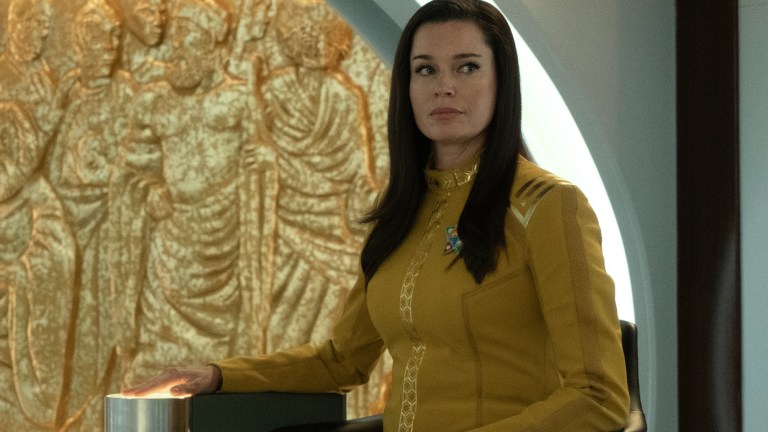Strange New Worlds: Illyrians Call Back to One of Star Trek’s Darkest Moments
Illyrians like Rebecca Romijn's Commander Una Chin-Riley and Yetide Badaki's Neera may be new to Strange New Worlds, but their conflict with the Federation goes back to Star Trek's dark past.

This Star Trek: Strange New Worlds article contains spoilers.
It always comes back to Khan. Yes, even the latest episode of Star Trek: Strange New Worlds, which finds Number One aka Commander Una Chin-Riley on trial for hiding her Illyrian heritage of genetic modification, and in the process violating the Federation’s restriction against augments. As made clear by Number One’s defense lawyer and fellow Illyrian Neera (Yetide Badaki), the ban seems to contradict the Federation’s central values, one that seeks (as the Vulcans put it) infinite diversity in infinite combinations.
In order to understand why the Federation restricts genetically modified individuals, one must take a look at one of the most infamous villains of the franchise: Khan Noonien Singh. Although Khan first appeared in the 1967 Original Series episode “Space Seed,” and then returned for the beloved 1982 movie Star Trek II: The Wrath of Khan, he has his roots in the 1990s.
Not our ’90s, of course, but the ’90s of the Star Trek universe. That’s when Khan conquered over a quarter of the Earth, making him the most powerful of the era’s augmented warlords. Eventually, humanity resisted their modified overlords, resulting in the Eugenics Wars, battles that destroyed large swaths of the planet and killed over 30 million people. At the end of the war, Khan and his cohort were sentenced to exile. When Earth formed the United Federation of Planets with Vulcan, Tellar, and Andoria, they convinced the organization to protect itself by adopting their ban on augments.
As dire as the Eugenics Wars certainly were, humans began modifications with the best of intentions. According to the background provided in “Space Seed,” scientists pursued augmentations and selective breeding as a response to the Cold War, hoping to help humanity evolve past the warlike nature that almost drove the planet to nuclear war.
Star Trek has always positioned its optimistic future against tragedies of the past, both real and fictional. Within the timeline of the universe, the Eugenics Wars are a part of humanity’s descent into its worst qualities, along with the rampant wealth inequality of the mid-2020s (Trek sure nailed that one) that led to the Bell Riots and eventually World War III in 2026. According to Star Trek lore, it’s from the ashes of all these tragedies that Zefram Cochrane creates humanity’s first warp-capable ship, prompting the Vulcans to make first contact with them, as seen in Star Trek: First Contact.
In the real world, eugenics is now recognized as an inaccurate science based on racist assumptions. While the world of Star Trek never fully embraces that realization, the franchise has shown sympathy for those harmed by the Federation dictate. Before Commander Chin-Riley, the most notable example was Doctor Julian Bashir of Star Trek: Deep Space Nine. Bashir suffered from poor health and struggled in school as a child, which greatly disappointed his parents. To make their child into what they expected, Bashir’s parents had him augmented, which eventually made him a brilliant thinker and outstanding physical athlete. Bashir learned of his augmentations when he was 15, but kept it a secret as he began his Starfleet career.
Throughout the later seasons of Deep Space Nine, we see the heavy toll the augmentations placed on Bashir. He felt great rejection at the heart of his parents’ decision, sensing that he fundamentally was not good enough for them. Like Commander Chin-Riley, Bashir was nearly court-martialed for his deception, a vulnerability that made him a target for Starfleet’s black ops organization Section 31.
The Federation may not see much difference between different forms of Augments, but as the most recent episode of Strange New Worlds makes clear, there’s a marked distinction between Illyrian and other genetically modified people. The Illyrians are a relatively unexplored race in Trek lore, having only been encountered once before, in the Star Trek: Enterprise episode “Damage,” where Captain Archer makes a desperate decision when dealing with an Illyrian ship.
Through Strange New Worlds, and some extra-canonical books, we learn more about Illyrians. Unlike those we saw on Enterprise, Chin-Riley and other Illyrians are indistinguishable from humans. While their augmentations pass down to their offspring biologically rather than externally, Illyrians still see their modifications as part of their culture.
There’s no denying that the Eugenics Wars cast a long shadow over humanity, even as they’ve become key members of the Federation. Humans still fear that they have the potential to become another Khan and take drastic measures to avoid it. But as we see in characters like Bashir, Number One, Neera, and even Khan’s descendent La’an Noonien-Singh, when fear drives us to exclude people, we all suffer the loss.
Star Trek: Strange New Worlds season 2 is streaming now on Paramount+.
